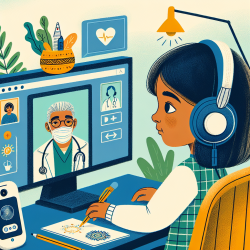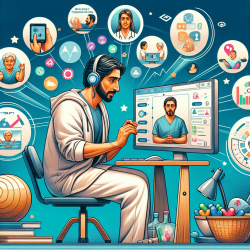Telemedicine has seen a significant rise in application across various medical specialties, including otolaryngology, especially during the COVID-19 pandemic. The research article titled "Telemedicine and Telementoring in Rhinology, Otology, and Laryngology: A Scoping Review" provides an extensive overview of the current applications of telemedicine in these fields. This blog aims to help practitioners improve their skills by implementing the outcomes of this research or encouraging further exploration into the potential of telemedicine.
Key Findings and Implications
The scoping review highlights two main applications of telemedicine in otolaryngology: virtual encounters and telementoring. These applications can be further classified into seven subdomains, each demonstrating different levels of feasibility, cost-effectiveness, and patient/provider satisfaction.
1. Virtual Encounters (VEs)
Virtual encounters involve consultations held via telephone or video-based platforms. The review identified 164 articles focusing on VEs, showing high patient and provider satisfaction, cost savings, and feasibility. Key subdomains include:
- Patient-physician interaction
- Physician-physician interaction
- Patient engagement tools
- Tele-screening
- Tele-rehabilitation
Studies indicate that remote cochlear implant management, tele-screening for hearing disorders, and tele-rehabilitation for conditions like tinnitus and vertigo are effective and comparable to in-person care.
2. Telementoring
Telementoring involves remote guidance and mentoring through telecommunication technologies. Nine studies evaluated telementoring, particularly in surgical training. Results showed no significant differences in clinical outcomes between in-person and telementored surgeries. This approach can be invaluable for training advanced surgical trainees and facilitating remote consultations among specialists.
Challenges and Future Directions
Despite the promising results, several challenges need to be addressed for the widespread adoption of telemedicine:
- Quality of Physical Examination: The technical quality of remote examinations can limit diagnostic accuracy.
- Security and Privacy: Ensuring HIPAA-compliant systems is crucial for protecting patient data.
- Licensing Requirements: Telemedicine providers must navigate varying state licensing regulations.
Future developments in telemedicine are expected to incorporate advanced technologies like artificial intelligence and augmented reality, enhancing the diagnostic and therapeutic capabilities of remote care.
Encouraging Further Research
The review underscores the need for more rigorous research to demonstrate the patient benefits of telemedicine at high levels of evidence. Practitioners are encouraged to explore the potential of telemedicine in their practice, contribute to ongoing research, and stay updated with technological advancements.
To read the original research paper, please follow this link: Telemedicine and Telementoring in Rhinology, Otology, and Laryngology: A Scoping Review.










